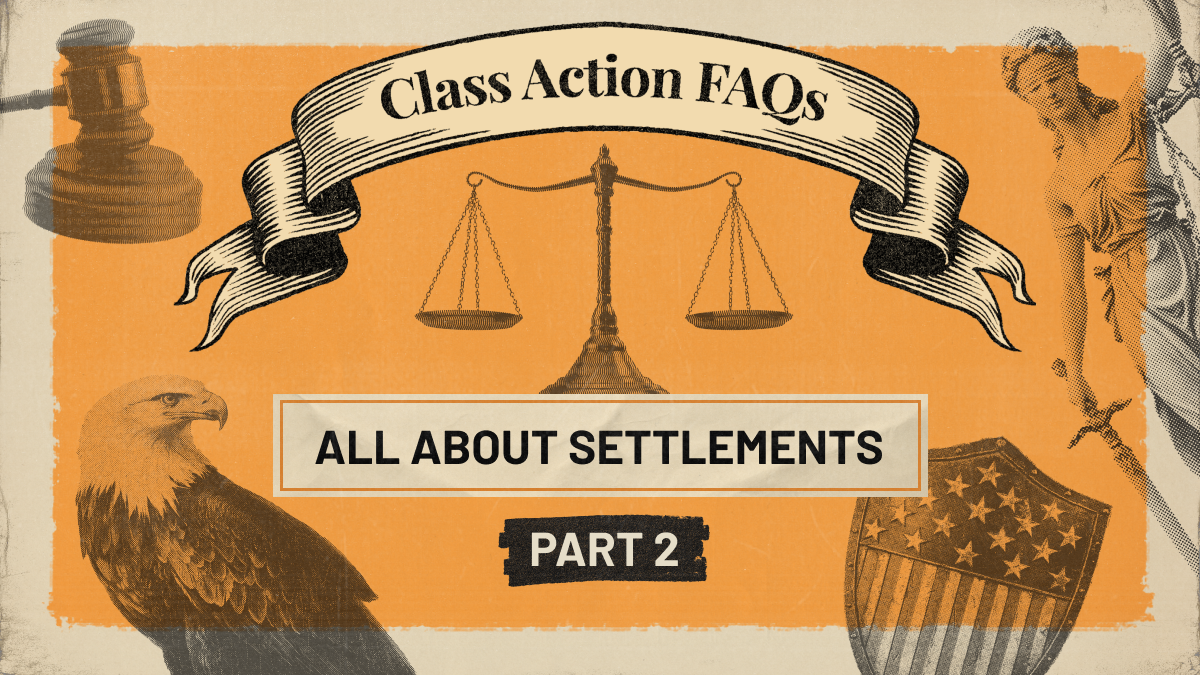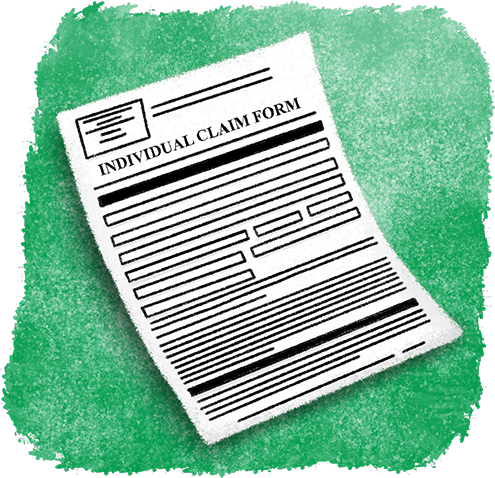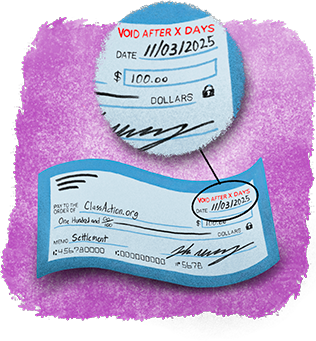Class Action FAQs: All About Settlements Part II
by Ty Armstrong
Last Updated on February 28, 2025

It’s been a while since we dug into some frequently asked questions from our readers, but we’re back to answer more as best we can. We aren’t attorneys ourselves, so this isn’t legal advice or anything of the sort, but hopefully we can shed some light on the seemingly complicated settlement process. Welcome to part two of our series on frequently asked settlement questions.
Get class action lawsuit and settlement news sent to your inbox – sign up for ClassAction.org’s free weekly newsletter here.
What Happens If You Don’t File a Claim for a Class Action Settlement?

In most cases, you will need to fill out a claim form to get your piece. As you’ve probably noticed, most large class action settlements have a deadline, and if you don’t get your claim in before then, you’ve most likely missed out on your chance at receiving payment.
Additionally, if you’re covered by a settlement and you don’t file a claim when you’re required to (and you don’t opt out), you’re also likely giving up your right to file your own lawsuit over the same allegations under the terms of the settlement deal.
There are, however, less common scenarios in which the settlement administrator has all the information it needs on the affected class members – that is, those covered by the settlement – and has set things up for compensation to be sent out automatically. In these types of settlements, you likely won’t have to fill out a claim form to receive your payment, but they are still good to be aware of, as you may be given a chance to choose how your money comes in.
So, in the best-case scenario, you’re potentially getting a check in the mail anyway, and in the worst (and more likely) case, you’re being left without any of the money you're owed and without any right to recourse.
Be sure to stay up to date on settlements that may affect you by visiting our settlements page regularly, or by signing up for our free newsletter to get new settlements delivered straight to your inbox.
Is It Against the Law to Claim a Class Action Settlement When You're Not Eligible?
In short, yes.
Specifically, you would be engaging in fraud by making false claims in order to obtain material gain and committing perjury, as a completed claim form is considered a legal affidavit, essentially equating to the act of lying under oath. If you’ve ever filled out a claim form for a settlement, you’ve likely seen text like this as you complete it (this one is taken from the recent Facebook internet tracking settlement):
By signing below and submitting this Claim Form, I hereby swear under penalty of perjury that the information provided in this Claim Form is, to the best of my knowledge, true and correct, and that I have not submitted another claim in connection with this Settlement and know of no other person having done so on my behalf.”
Statements like this aren’t for show.
Claiming a portion of a class action settlement if you aren’t a class member is not only illegal, it also means those who were legitimately affected could be receiving less than they should as settlement funds deplete. (Oftentimes, class members receive equal or pro rata shares of the fund.) While it may seem tempting to fill out a simple form that doesn’t require proof of purchase, is it really worth risking jail time or fines over a $15 check? Besides, there are plenty of settlements that you probably do qualify for. Check out our regularly updated settlements pagehere.
What Should I Do If I Accidentally Filed a False Class Action Settlement Form?
Sometimes, accidents happen. You may have come across a situation where you realize you accidentally entered incorrect information (e.g., how many of a product you bought) just after you hit “submit.” Maybe you filled out a form and later came to find out someone else already filled one out for your household, or perhaps you filled out the Post Raisin Bran claim form and came to realize you’ve exclusively been buying Kellogg’s for years.
These are things that should be remedied, and they can likely all be resolved the same way. Any issues with the form, potential errors or duplicate submissions should be brought to the settlement administrator as soon as possible to limit any complications with your claim. Their contact information can typically be found on the same site where you filled out the form, likely on the “contact” page.
What Should I Do If My Class Action Settlement Check Expired?

When you get a settlement check in the mail, it’s always a good idea to deposit it right away to avoid a situation like this. But we get it – life happens, and things get in the way. Unfortunately, if you’ve lost track of your settlement check and find that it has expired before you got a chance to deposit it, there may not be much you can do.
Your best bet is to reach out to the settlement administrator to see if anything can be done. They may be able to help you out, but it will likely depend on the specific settlement and how long it’s been since the settlement deadline passed given that any unclaimed settlement money can be distributed to non-profit organizations as cy pres awards, and there may not be anything left. Again, it’s best to handle the check as soon as it comes in to avoid missing out.
What If I Missed the Settlement Deadline for a Class Action?

Unfortunately, the answer to this question plays out much like the one just above. If you missed the deadline to file a class action settlement claim, you’re likely out of luck. It’s still worth taking the time, though, to reach out to the settlement administrator to see if anything can be done, but it’s better to stay on top of these deadlines if you can.
We do our best to keep our settlements page up to date with active settlements that you may qualify for, and you can have the latest ones and those expiring soon delivered right to your inbox via our free newsletter. You never know when a settlement pertaining to you may pop up.
How Long Does It Usually Take to Receive a Check from a Class Action Settlement?
As we’ve outlined in this blog post, there’s quite a bit involved in the settlement process, and it can take a frustrating amount of time from when you fill out a claim form to when your check comes in the mail. But how much time, exactly?
Unfortunately, there are so many factors involved that there is no definite timeline that applies to every settlement. The settlement agreement needs two forms of approval, claim forms need to be reviewed by the administrators and other pieces need to come together before checks can be sent out.

In addition, larger settlements typically have more claims filed, which means it will take longer for the administrator to go through them all, and objections to the settlement can make things take longer too. Plus, even if the settlement is finally approved, the decision can still be appealed. And, even when checks do go out, it ultimately comes down to the efficiency of the mail service in your area.
We went into a bit more detail on the things that can hold up your check in our previous FAQs post about settlements – and you can find it right here.
Am I Bound by a Class Action Settlement If I Didn't Know About the Lawsuit?
Many of us have come across a settlement well after the deadline has passed and compensation has been sent out only to realize that we never heard about the lawsuit in the first place. In instances like this, are we still bound to the terms outlined in the settlement agreement?
Unfortunately, if the deadline passed and you didn’t opt out of the settlement to pursue your own case, there isn’t much to be done. The funds are likely already depleted at this point, and because of the settlement agreement (even if you didn’t actively take part), you would still be counted as a class member who did have compensation made available to them. This means you wouldn’t be able to pursue what would then be considered another lawsuit over the same issue.
That being said, we know of at least one instance where a lawsuit was filed claiming that the defendant in the case made a mistake in sending out proper notice of a settlement to those affected – allegedly leaving many who qualified for the settlement in the dark. You can read up on that filing here.
The case ended up being dismissed, but it did stand to prove that lawsuits like this are possible and that there may still be options for those who missed out on a settlement. So, if you ever have questions about your legal rights and what options you have going forward, it’s worth reaching out to an attorney. They typically offer free initial consultations and would be able to show you what steps you can take from there, if any.
That’s all we have for this installment on class action settlements, but if you have any questions about the process, share them with us down in the comments, and we may have a part three headed your way soon.
Want to stay in the loop on class actions that matter to you? Sign up for ClassAction.org’s free weekly newsletter here.
Video Game Addiction Lawsuits
If your child suffers from video game addiction — including Fortnite addiction or Roblox addiction — you may be able to take legal action. Gamers 18 to 22 may also qualify.
Learn more:Video Game Addiction Lawsuit
Depo-Provera Lawsuits
Anyone who received Depo-Provera or Depo-Provera SubQ injections and has been diagnosed with meningioma, a type of brain tumor, may be able to take legal action.
Read more: Depo-Provera Lawsuit
How Do I Join a Class Action Lawsuit?
Did you know there's usually nothing you need to do to join, sign up for, or add your name to new class action lawsuits when they're initially filed?
Read more here: How Do I Join a Class Action Lawsuit?
Stay Current
Sign Up For
Our Newsletter
New cases and investigations, settlement deadlines, and news straight to your inbox.
Before commenting, please review our comment policy.